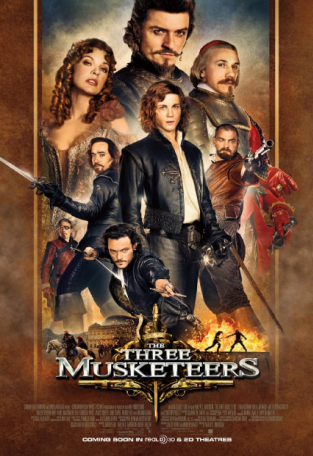By Michael Scoular (The Cascade) – Email
Date Posted: October 27, 2011
Print Edition: October 26, 2011
 Paul W.S. Anderson’s The Three Musketeers is founded on a remarkably terrible script. Like many other mass-market movies, whether to continually disprove arguments that the screenplay is a movie’s centrepiece or out of a contagious negligence spreading throughout the industry, what comes out of characters’ mouths is of no importance. And that hardly seems to matter here. From the film’s opening sequences, we are greeted with a map populated with models and action-figure posed posters for each of the movie’s main props/actors. The world of Dumas is a set of toys for Anderson, where the rules and lines of the original work mean little, and the potential of bringing along his own creations and filmmaking tendencies means a great deal more.
Paul W.S. Anderson’s The Three Musketeers is founded on a remarkably terrible script. Like many other mass-market movies, whether to continually disprove arguments that the screenplay is a movie’s centrepiece or out of a contagious negligence spreading throughout the industry, what comes out of characters’ mouths is of no importance. And that hardly seems to matter here. From the film’s opening sequences, we are greeted with a map populated with models and action-figure posed posters for each of the movie’s main props/actors. The world of Dumas is a set of toys for Anderson, where the rules and lines of the original work mean little, and the potential of bringing along his own creations and filmmaking tendencies means a great deal more.
This jarring then amusing dichotomy results in tepid lines as a father instructs a son to “make mistakes, fight, love, and remember you are a Gascon,” set against grand images as that son, d’Artagnan arrives in Paris. The actors have the same air about them, speed mumbling through exposition and scenes where Grand Themes are related, never wiping grins off their faces, or in the case of Milla Jovovich, bursting into laughs. They also take great pleasure, as Christoph Waltz does, in the hammy dialogue, making it appear intentional, rather than a sign of the script’s weakness. No one bothers to bring a French accent along, which only adds to the nonsensical nature of all the dialogue heavy scenes. Perhaps no scene illustrates this better than one in which d’Artagnan, attempting to speak to Constance, the object of his affection, blurts out what is either improvised or impossibly bad dialogue. “Hey, hey, excuse me,” he says in front of an impeccable framing of a water fountain set in the middle of a palatial garden. Anderson couches the clumsy in the grand, bringing out the comical in the excessive.
The decision to ignore the text, to turn classical literature into a modern explosion of clichés and art direction, could be perceived as a rending of a masterpiece. But Anderson is not making The Three Musketeers as anyone’s entry into Dumas, he is aware of the many adaptations that have gone before. This is not a distortion of history, but a detour, an attempt to make a piece of entertainment that plays on what has already been done. To play a Musketeers movie safe would certainly be better than some of the more recent “adaptations” of the novel, but Anderson has a keen eye for when to go over the top. In scenes like a royal gathering for the purpose of honouring the musketeers, there is the feeling of fascination with this world, carrying over from the models of the beginning. The carefully constructed costuming and sets speak to how this is not some flippant, dull, work for cash making purposes only, but an attempt to excite the eye, done by a director who knows how to do so.
To be sure, the action scenes do not all play so well. The editing seems to hide the choreography at times, and none of the actors possesses anything approaching the physical dexterity of Douglas Fairbanks, Sr., but the most absurd addition to the tale: airships, play well, and the speed ramping of the sabre duels comes close to, but is not overused. The final duel between two swordsmen in a precarious position, shot by swooping camera, would seem to invite comparisons to the Pirates of the Caribbean franchise. The key difference is that here, there is no Johnny Depp, devouring and encroaching on the rest of the movie with his engorged persona, no laborious plot, and adventure conveyed through visual style rather than oppressively loud Hans Zimmer score. Orlando Bloom in The Three Musketeers could be said to sum up the movie. Playing his character to the edge of craziness, he abandons the blank heroes of his past, here occupied by d’Artagnan, who accordingly is not given the bulk of screen time. Jousting in terms of fashion repeatedly, his appearance is at once laughable, yet somehow held in place, defiantly imperfect.

